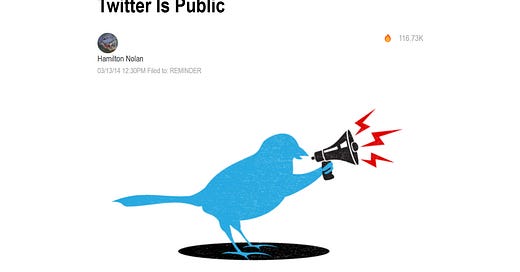BlueSky, Twitter, Celebrity, and the Is/Ought Distinction
yes I'm obsessed with the is/ought distinction
Edit: I had no idea comments were off, they’re on now, GRRRRRRRRR
I was on the Honestly podcast, chatting about the election with Michael Moynihan and Ruy Teixeira. Check it out.
Would you rather join BlueSky or Twitter? Mastodon? Threads? Or would you prefer to join me in my windowless garage, where I’ve got the engine running?
You’ve got X, a network owned by a guy who bases his whole life on making other people think that he doesn’t care what they think. (The kind of guy who would rename a popular social media site “X.”) And you’ve got BlueSky, a network populated exclusively by people who Googled “BIPOC” the day the term got popular and then proceeded to act like they had always used it. You’ve got a network that’s been invaded by guys who buy katanas at Epcot Center and you’ve got a network filled with people who get gluten-free water imported for $7 a bottle. It’s that guy at your high school who bought a black duster specifically because Columbine happened and the girl at your high school who successfully lobbied to have all gym classes canceled because gym is ableist. It’s a girl with “future tradwife” in her bio who DMs offers to send her nudes in exchange for Robux vs. a guy who’s very, very proud to own a shirt that says “Kill All Men.” It’s a Gigachad meme that infects your computer with malware that secretly uses your phone to mine PepeCoin or an inspirational Instagram account that posts girlboss quotes plagiarized from The Fountainhead. It’s aggressively weak men who fetishize strength or people who have based their personal and professional lives on performative vulnerability. It’s all of the worst tendencies of the backlash to our stumbling efforts against bigotry vs. those whose arrogance and myopia have empowered that backlash.
This is where I get yelled at for Both Sidesing. But I’m not suggesting both broad kinds of people are equally bad; if I had to have American policy be determined by polling the userbase of X or the userbase of BlueSky, I would choose the latter and sigh as they passed a law that ordered my own personal execution on public safety grounds. They’d probably do it by forcing me to drink fair trade cyanide through a paper straw.
But that’s not a real question. The real question is what this moment tells us about online networks and what they’re for. The recent wave of liberals decamping from Twitter/X to progressive safe-haven BlueSky tells us a good deal about our moment and what the social internet is in 2024. I do think that a lot of people are putting too much emphasis on the echo chamber dimensions of that dynamic; yes, they’re building an echo chamber and that’s bad, and that instinct is indicative of why liberals have had such a hard time understanding the Trump era. (Then again, Elon Musk bought Twitter because he was mad that its echo chamber wasn’t echoing his own views.) The issue that concerns me here is not people building networks that enable them to hide within the safety of their own worldview, which has been happening throughout human history. What concerns me is the connection to a little-remembered controversy from a very different political era, referenced in the image at the top: whether tweets are public, that is, whether it’s fair or ethical to refer to the public tweets of those who don’t want to be referred to, particular those from “marginalized identities.” In other words, what’s really important here is a seductive desire: to have the benefits of publicity without the drawback of public accountability. And I think that, strangely, the BlueSky refugees say a lot about recent debates over celebrity and fan culture, as exemplified by controversies regarding pop star Chappell Roan and NFL personality Jason Kelce.




